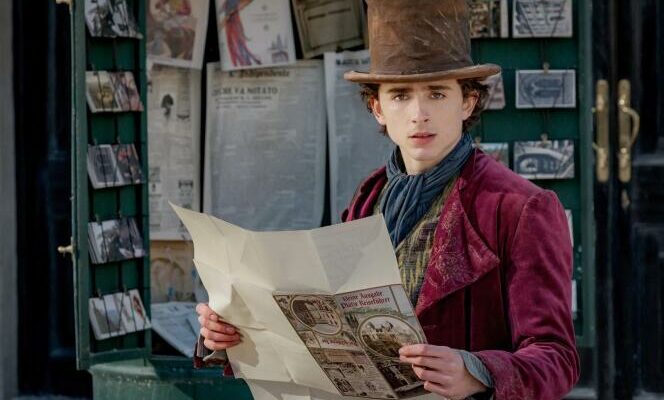The opinion of “Le Monde” To see
“I need some giraffe milk!” », exclaims Willy Wonka (Timothée Chalamet), at the corner of a dark alley in a perhaps European city, after having traveled the world. The young man, in the crumpled top hat, was tricked by an innkeeper, no longer has a penny in his pocket but holds firm to his ambitions: to make his chocolates known and open his store at the Galeries Gourmet, top place of treats.
The milking of ruminants at the city zoo is one of the most beautiful sequences in the film, a prequel to Charlie and the chocolate factory (1964), the seminal novel by British writer Roald Dahl (1916-1990): Wonka places his tunic on a valet, coaxes the beast with menthol candies and gets to work. His teammate, Noodle (Calah Lane), mounted on a stepladder, strokes the animal’s chin as it bats its eyelashes like a young lady.
We feared that Wonka is dripping with special effects to rival the mountains and rivers of chocolate described in the tale, it is quite the opposite. From the giraffe’s milking, only a small macaron will emerge, to be tasted delicately. The new masters of British children’s comedy, co-writer Simon Farnaby and director Paul King (who have already exercised their talents for the benefit of the two parts of Paddington), blow away the largesse of orgiastic pleasure to favor the detail, the tiny, the rarity.
When it comes to Wonka’s culinary creations, the staging refuses the close-up, the overload, the shapeless softness, to present the candies in the manner of very small refined things slipped surreptitiously here and there. We can’t help but let ourselves be seduced by the varied range of Chocovol, Hair Repair éclairs and Mamma’s Wonka bars and admire their marvelous setting: an elegant fictional city, with the false air of Bruges, Milan or Paris.
Light as a feather
In the original novel, Willy Wonka is already old. This eccentric boss, full of anxiety, has been hiding for ten years in his castle-factory which went bankrupt. In order to find his successor, he lets five children win a “golden ticket” which he has hidden under the wrapper of his chocolate bars. In Paul King’s musical prequel, Wonka is light as a feather, optimistic and energetic enough to take on the “chocolate cartel” who wants him down.
Written by Neil Hannon (The Divine Comedy), the sung parts participate in the phantasmagoria which benefits primarily from the director’s visual and poetic inventions. Let us cite the aerial farandole of ultra-chic strollers who stopped to eat a Chocovol, the tribal dance of the first of the Oompa-Loompas (Hugh Grant digitally reduced to 30 centimeters high) intended to oversee the workforce of the future Wonka factory, the enchanted mechanics of cleaning laundry…
You have 30% of this article left to read. The rest is reserved for subscribers.
